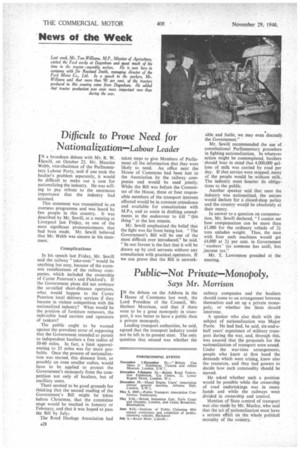Difficult to Prove Need for Nationalization—Labour Leader I N a broadcast debate with Mr. R. W.
Page 30

If you've noticed an error in this article please click here to report it so we can fix it.
Sewill, on October 23, Mr. Maurice Webb, vice-chairman of the Parliamentary Labour Party, said if one took the haulier's problem separately,. it would be difficult to make out a case for nationalizing the industry. He was willing to pay tribute to the enormous importance that the industry had attained.
This statement was transmitted in an overseas programme and was heard by few people in this country. It was described by Mr. Sewill, at a meeting at Liverpool last Friday, as one of the most significant pronouncements that had been made. Mr. Sewill believed that Mr. Webb was sincere in his statement.
Complications In his speech last Friday, Mr. Sewill said the railway " take-over " would be anything but easy, because of the extensive ramifications of the railway companies, which included the ownership of Carter Paterson's and Pickford's. if the Government plans did not embrace the so-called short-distance operators, what would happen to the Carter Paterson local delivery services if they became in violent competition with the nationalized industry? What would be the position of furniture removers, the indivisible load carriers and operators of tankers?
The public ought to be warned against the prevalent error of.supposing that the Government intended to permit to independent hauliers a free radius of 50-60 mites. In fact, a limit approximating to 25 miles was far more probable. Once the process of nationalization was started, this distance limit, or possibly an even smaller radius, would have to be applied to protect the Government's monopoly from the competition not only of hauliers, but of ancillary users.
There seemed to be good grounds for thinking that the second reading of the Government's Bill might be taken before Christmas, that the committee stage would be reached in January or February, and that it was hoped to pass the Bill by July: The Road Haulage Association had taken steps to give Members of Parliament all the information that they were likely to need. An office near the House of Commons had been lent to the Association by the railway companies and would be used jointly. While the Bill was before the Committee of the House, three or four responsible members of the transport interests affected would be in constant attendance and available for consultations with M.P.s, and to assist in drafting amendments in the endeavour to kill "this thing" at the last minute.
Mr. Sewill emphasized the belief that the fight was far from being lost. "The Government's Bill will be one of the most difficult ever introduced," he said. "In our favour is the fact that it will be drawn up by civil servants without any consultation with practical operators. If we can prove that the Bill is unwork able and futile, we may even discredit the Government."
Mr. Sewill recommended the use of constitutional Parliamentary procedure in fighting nationalization. In whatever action might be contemplated, hauliers should bear in mind that 4,000.000 gallons of milk was carried by road per day. If that service were stopped, many of the people would be without milk. The industry must honour its obligations to the public.
Another speaker said that once the industry was nationalized, the unions would declare for i closed-shop policy and the country would be absolutely at their mercy.
In answer to a question on compensation, Mr. Sewill declared, "I cannot see how compensation can be more than £1,000 for the ordinary vehicle of tons unladen weight. Thus, the man with four such machines would get £4,000 at 21. per cent. in Government washers (as someone has said), less income tax."
Mr. T. Lawrenson presided at the meeting.
























































































